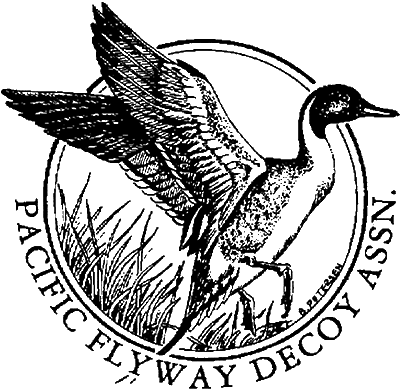Library of Congress Bicentennial Celebration Presentation - Page 6

holds the note pad. Judges: Lew Clingan, of Sacramento; Ed Williams, of San Rafael;
and Dr. Hamilton Kelly, of San Marino.
The Tule Rats ("a loose association of Pacific Coast waterfowlers") numbered seven members who had pooled resources and about $300 to cover printings, mailings, and ribbons to hold a contest. No official roster of their names exists, for by the end of this historic occasion, everyone present had gone home happily convinced that they had all been "Original Tule Rats"; a reflection of the good time and high spirits. The contest had attracted 97 entries, brought by nineteen carvers from central and southern California, and from Oregon. These, with a handful of collectors, judges, and family members, filled up the boatyard to the approximate number of 50.
In show business, any turnout rates as a "success", and this one filled the bill. Everyone present knew of the spreading national interest in decoys, and that the west had its own great waterfowling traditions, and felt that the numbers would improve in time. In the hindsight of years of contests, it can be calculated that those legendary shows of Bellport '23 and 5th Avenue '24, hadn't done any better. The Bellport count had been garbled by that late-arriving reporter - who made no distinction between birds in competition and birds on display - and the Winchester contest had bombed with only 42 entries. What cannot be argued from these numbers, and that aborted series of New York Nationals, is that decoy contests weren't a spectator sport worthy of Madison Square Garden, nor could they draw the kind of audiences that would make it on Broadway.
So tryouts in Berkeley would play as well as anywhere. In 1972, with dues paying membership of about 80, a reorganized group now calling themselves the Pacific Flyway Decoy Collectors Association, moved up the foothills to the Claremont Resort Hotel. The guest list now included contestants from Arizona, Oregon, and California. Shorebird decoys were added to the competition, and these were quickly judged in the cocktail comforts of the hotel, but the next morning the duck and goose decoys were hauled out to the bayside Richmond Rod & Gun Club, where, in a searingly hot and dusty gravel parking lot in the rear of a restaurant bar, the plastic kiddie pool was once more set out and filled. Here at the lowest point in club history, the Pacific Flyway Decoy Association held its 2nd annual show - entirely ignored by the Rod & Gun Club sports inside the bar, as well as the sports afield.
